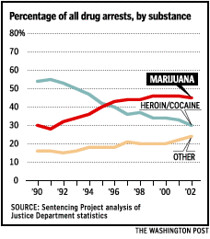Lies, damn lies, and statistics
The Drug War (or, NAMBLA) feeds upon itself. With the decline in crack cocaine since the end of the 1980s, local law enforcement, not wanting to admit that it could reduce the resources being used on drug enforcement or reallocate those funds to less high-profile law enforcement programs, have instead targeted those resources in the century's old fight against demon marijuana.
Good God. This would be fodder for satire if it weren't such a bald faced and dangerous misinterpretation of research data. Murray implies -- if not downright claims -- a causal relationship between schizophrenia and use of marijuana by teens. No such relationship has been shown, since there is no way to know if teens who smoked pot and later exhibited signs of schizophrenia were already vulnerable to mental illness. And to claim that some sort of "Super Weed" is the culprit makes Bush's scare tactics on Iraq and Social Security look positively timid. Such irresponsible claims and pseudoscience may lead parents to take draconian steps to force their kids to quite smoking pot rather than take notice of and seek treatment for signs that their kid's mental health may be imperiled. Or, what may be equally frightening, that parents will suddenly cart their otherwise normal kid off to a mental health facility when mom finds a roach in junior's pants while doing the laundry.
But that's of no concern to the Drug Warriors. What is of concern is that fears of the drug scourge not abate and funding wane.
It is so dispiriting to watch as marijuana is used as a means to advance crackpot theories, and the press fails to cry bullshit on them.
"In reality, the war on drugs as pursued in the 1990s was to a large degree a war on marijuana," said Ryan S. King, the study's co-author and a research associate at the Sentencing Project. "Marijuana is the most widely used illegal substance, but that doesn't explain this level of growth over time. . . . The question is, is this really where we want to be spending all our money?"
The think tank is a left-leaning group that advocates alternatives to traditional imprisonment. Criminologists and government officials confirmed the trend, which in some ways marks a return to a previous era. In 1982, marijuana arrests accounted for 72 percent of all drug arrests, according to the study.
Bush administration officials attribute the rise in marijuana arrests to a variety of factors: increased use among teenagers during parts of the 1990s; efforts by local police departments to focus more on street-level offenses; and growing concerns over the danger posed by modern, more potent versions of marijuana. The White House Office of National Drug Control Policy released a study yesterday showing that youth who use marijuana are more likely to develop serious mental health problems, including depression and schizophrenia.
"This is not Cheech and Chong marijuana," said David Murray, a policy analyst for the anti-drug office. "It's a qualitatively different drug, and that's reflected in the numbers."
Good God. This would be fodder for satire if it weren't such a bald faced and dangerous misinterpretation of research data. Murray implies -- if not downright claims -- a causal relationship between schizophrenia and use of marijuana by teens. No such relationship has been shown, since there is no way to know if teens who smoked pot and later exhibited signs of schizophrenia were already vulnerable to mental illness. And to claim that some sort of "Super Weed" is the culprit makes Bush's scare tactics on Iraq and Social Security look positively timid. Such irresponsible claims and pseudoscience may lead parents to take draconian steps to force their kids to quite smoking pot rather than take notice of and seek treatment for signs that their kid's mental health may be imperiled. Or, what may be equally frightening, that parents will suddenly cart their otherwise normal kid off to a mental health facility when mom finds a roach in junior's pants while doing the laundry.
But that's of no concern to the Drug Warriors. What is of concern is that fears of the drug scourge not abate and funding wane.
But increasingly, some experts have begun to argue that the U.S. drug war, which costs an estimated $35 billion a year, has had a minimal impact on consumption of illicit substances. The conservative American Enterprise Institute published a report in March titled "Are We Losing the War on Drugs?" Its authors argue that, among other things, "criminal punishment of marijuana use does not appear to be justified."
The study released yesterday by the Sentencing Project found that arrests for marijuana account for nearly all of the increase in drug arrests seen during the 1990s. The report also found that one in four people in state prisons for marijuana offenses can be classified as a "low-level offender," and it estimated that $4 billion a year is spent on arresting and prosecuting marijuana crimes.
In addition, the study showed that although African Americans make up 14 percent of marijuana users generally, they account for nearly a third of all marijuana arrests.
It is so dispiriting to watch as marijuana is used as a means to advance crackpot theories, and the press fails to cry bullshit on them.



0 Comments:
Post a Comment
<< Home